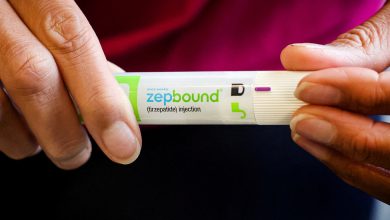F.D.A. Orders Juul to Stop Selling E-Cigarettes

The Food and Drug Administration on Thursday ordered Juul to stop selling e-cigarettes on the U.S. market, a profoundly damaging blow to a once-popular company whose brand was blamed for the teenage vaping crisis.
The order affects all of Juul’s products on the U.S. market, the overwhelming source of the company’s sales. Juul’s sleek vaping cartridges and sweet-flavored pods helped usher in an era of alternative nicotine products among adults as well, and invited intense scrutiny from antismoking groups and regulators who feared they would do more harm to young people than good to former smokers.
“Today’s action is further progress on the F.D.A.’s commitment to ensuring that all e-cigarette and electronic nicotine delivery system products currently being marketed to consumers meet our public health standards,” Dr. Robert M. Califf, the agency commissioner, said in a statement. “The agency has dedicated significant resources to review products from the companies that account for most of the U.S. market. We recognize these make up a significant part of the available products and many have played a disproportionate role in the rise in youth vaping.”
The move by the F.D.A. is part of a wide-ranging effort to remake the rules for smoking and vaping products and to reduce illnesses and deaths caused by inhalable products containing highly addictive nicotine.
On Tuesday, the agency announced plans to slash nicotine levels in traditional cigarettes as a way to discourage use of the most deadly of legal consumer products. In April, the F.D.A. said it would move toward a ban on menthol-flavored cigarettes.
The action against Juul in particular is part of a newer regulatory mission for the agency, which must determine which electronic cigarettes currently for sale, or proposed for sale, will be allowed onto U.S. shelves permanently now that the F.D.A. has authority over e-cigarettes.
But it could take years before these proposals take effect — if they can withstand fierce resistance from the powerful tobacco lobby, antiregulatory groups and the vaping industry.
Juul is expected to appeal the F.D.A.’s decision.
Public health groups hailed the ruling.
“The F.D.A.’s decision to remove all Juul products from the marketplace is both most welcomed and long overdue,” said Erika Sward, national assistant vice president of advocacy for the American Lung Association. “Juul’s campaign to target and hook kids on tobacco has gone on for far too long.”
A statement from the American Vapor Manufacturing Association, an industry trade group, hinted at the fight ahead.
“Measured in lives lost and potential destroyed, F.D.A.’s staggering indifference to ordinary Americans and their right to switch to the vastly safer alternative of vaping will surely rank as one of the greatest episodes of regulatory malpractice in American history,” Amanda Wheeler, the association’s president, said in a statement.
Read More on Smoking and Vaping
- Nicotine Levels: Aiming to reduce the toll of smoking, the Food and Drug Administration is planning to require tobacco companies to slash the amount of nicotine in cigarettes.
- Menthol Ban: The F.D.A. has also proposed a plan to ban sales of menthol cigarettes, a measure experts say may save hundreds of thousands of lives, especially among Black smokers.
- ‘Smoking Is Back’: Cigarettes, still the No. 1 cause of preventable death in the United States, are making a comeback with a younger crowd.
- Vaping Loophole: A crackdown on flavored e-cigarettes was meant to curtail teenage vaping, but sales are rising due to synthetic nicotine.
- The Rise of Juul: A Times documentary traced the e-cigarette maker on its path from fledgling start-up to Silicon Valley juggernaut and, eventually, public health villain.
The agency’s ruling capped a nearly two-year review of data that Juul had submitted to try to win authorization to continue selling its tobacco- and menthol-flavored products in the United States. The application required the company to prove the safety of its devices and whether they were appropriate for the protection of public health.
Juul, in particular, had been the target of regulators, schools and policymakers for years, starting in 2018, when the F.D.A. began an investigation into Juul’s marketing efforts. Before that time, Juul had advertised its product using attractive young models and flavors like cool cucumber and creme brulee that critics said attracted underage users.
By April 2018, the F.D.A. announced a crackdown on the sale of such products, including Juul’s, to people under the age of 21.
Use among young people had soared. In 2017, 19 percent of 12th graders, 16 percent of 10th graders and 8 percent of eighth graders reported vaping nicotine in the past year, according to Monitoring the Future, an annual survey done for the National Institute on Drug Abuse.
For its part, Juul routinely denied that it targeted young people, but it was pursued in lawsuits and by state attorneys general, with some cases resulting in millions of dollars in damages against the company. In one settlement in 2021, Juul agreed to pay $40 million to North Carolina, which represented various parties in the state who asserted the company had helped lure underage users to vaping. More than a dozen other states have lawsuits and investigations that are still pending.
Dr. Scott Gottlieb, the former F.D.A. commissioner, explained his approval of the move against Juul on Wednesday, which was first reported in The Wall Street Journal.
The news is somewhat less weighty for the industry now than it would have been in Juul’s heyday, given the company’s plummeting market share. Once the dominant player with 75 percent of the market, Juul now has a considerably smaller share of the market.
But the news delivers a significant blow to Altria, formerly known as Philip Morris and the maker of Marlboro, which in December 2018 bought 35 percent of Juul for $12.8 billion. Because of smaller market share and regulatory headwinds, Altria said, the value of that stake fell to $1.7 billion by the end of 2021.
At its peak, Juul had more than 4,000 employees. It now has slightly over 1,000, mostly in the United States, but with some in Canada, Britain and other countries. Its revenue has fallen to $1.3 billion in 2021, down from $2 billion in 2019, with about 95 percent in U.S. sales.
Nicotine itself is not the cause of lung cancer and other deadly ills from smoking, but the drug is exceedingly addictive, making it difficult for smokers to quit despite the health risks. The adolescent brain is particularly susceptible to nicotine, which can affectmemory, concentration, learning and self-control.
Already, the e-cigarette companies have said they will challenge the decision in court.
E-cigarettes have been sold on the U.S. market for more than a decade without formal F.D.A. authorization, because they did not fall under the agency’s regulatory purview for several years.
In 2019, the F.D.A. issued a warning letter to Juul, saying that the company violated federal regulations because it had not received approval to promote and sell its products as a healthier option to smoking.
The agency has been reviewing all types of vaping products, some in development, for more than a year, and companies awaiting a decision have been allowed to keep selling some products.
The F.D.A. recently said it had so far rejected more than a million applications whose products it considered more of a health risk than a benefit. In October, it authorized R.J. Reynolds to continue marketing Vuse. This was the first time the agency granted approval to a vaping product made by a big cigarette company.
In its review of devices that it compared with traditional cigarettes, the agency said that the devices contained a “significant reduction” in harmful chemicals, although some were still present. The review said the toxins and potential cancer-causing chemicals were far lower in the blood and urine of people using the Vuse device compared with those of smokers.
Still, California law required R.J. Reynolds to warn Vuse buyers about exposure to glycidol, which is “known to the state to cause cancer” based on studies of mice and rats.
In March, the agency authorized several tobacco-flavored products from Logic Technology Development, saying the company was able to show that its products were likely to help adults make the transition from traditional cigarettes while posing a low risk of attracting young, new users.
But the agency disappointed some prominent lawmakers and advocacy groups when it announced recently that it would not be able to finish reviewing all of the e-cigarette marketing applications until June 2023, a year after a court-imposed deadline.
Some tobacco-control experts said the decision to ban Juul from the U.S. market was misguided and ultimately counterproductive.
Clifford Douglas, director of the Tobacco Research Network at the University of Michigan School of Public Health, said that the F.D.A. appeared to punish Juul for its past activity marketing to teenagers, and that many experts had come to see Juul and other e-cigarettes as valuable tools for helping adult smokers quit conventional cigarettes.
“They are so-called off ramps that can provide smokers an alternative to combustibles, which are responsible for virtually every death related to tobacco,” he said. “But now that off ramp is being narrowed and sort of paved over, which is putting millions of adult lives at risk.”
Christina Jewett and Sheila Kaplan contributed reporting.



